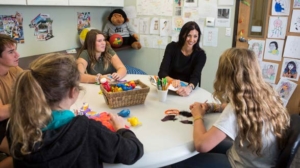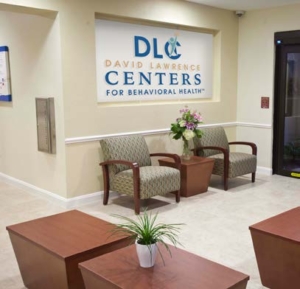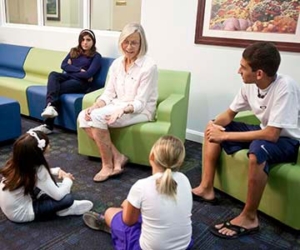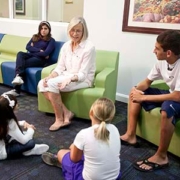Mental Health Month: Messages of Hope and Help

Children’s Partial Hospitalization Program art therapy session.
The coronavirus pandemic has been challenging for parents and children in big and small ways, but for some it has been more than difficult; it has been traumatic.
May is Mental Health Month – a time to raise awareness about common behavioral health issues and reduce stigma so that more people access the help they need. This year’s messages of hope and help are more critical than ever due to the profound and lasting impact the pandemic has had on the mental health of people of all ages – especially children and teens.
Fear, grief, stress, isolation and uncertainty have heightened anxiety and depression at a time when children have been separated from social supports and loved ones, including grandparents. The increase in psychological problems among children can be blamed on prolonged at-home schooling, more time spent on social media, worries about sick loved ones and the economic hardships families have faced over the last year.

Children’s Crisis Unit lobby.
The toll on children has been felt across all providers in the region. Local hospitals are reporting higher numbers of suicide attempts, self-harm incidents, and overdoses. Over the past year, the number of National Suicide Prevention Lifeline calls worked by David Lawrence Centers for Behavioral Health (DLC), Collier County’s non-profit behavioral health provider serving children, adults and families, has increased by more than 26%. The number of children admitted to the DLC Crisis Unit, Collier County’s only designated Baker Act Receiving Center, increased 18% and the average daily census increased by 33%.
“We are seeing record-breaking numbers of children on our Crisis Unit,” said Nancy Dauphinais, DLC Chief Operating Officer. “We have been so full that there have been many days we had to transfer kids out of the county because we don’t have room for them.”
When DLC is full, that puts a strain on area hospitals. Involuntary psychiatric committals grew by more than a third last year at The Golisano Children’s Hospital of Southwest Florida and by as much as two-thirds in some months.
Warning Signs and How to Help
The goal is to get children the help they need before they are in crisis. Caregivers should be on the lookout for unwanted thoughts, avoidance and physical changes – as well as changes in a child’s behavior that are getting in the way of their ability to function.

Children’s Crisis Unit group therapy session.
Children whose families have experienced significant economic hardships may be at greater risk of trauma, particularly if it led to major shifts in their environment. Children who experienced multiple stressors such as loss of a loved one, a parent who lost a job, and/or they are not going in-person to school are at greater risk.
Caregivers should have regular “check-ins” to address concerns and watch for subtle signs such as: changes in sleep and eating habits, inability to manage emotions, withdrawn and/or isolative, loss of interest, diminished academic performance, engaging in risky behaviors, inability to complete daily tasks, self-harm behaviors and/or thoughts of suicide and disconnecting with reality.
Adjustment disorders are common mental health diagnoses among youth and are best overcome with professional techniques that help children establish healthy coping skills and guide them through their emotions.
DLC’s Innovative Response
In response to the coronavirus pandemic, DLC launched anew Virtual Care Center to enhance safety and ensure access to treatment services. Virtual Care offers online and remote support, including virtual counseling and medical services. As an alternative to inpatient crisis support, adolescents 13 to 17 years-old can access the Partial Hospitalization Program (PHP), a day treatment program that provides structured, intensive, and medically supervised treatment for an average of one to three weeks. Services are provided in collaboration with the schools to ensure successful transition back to school after day treatment is completed.
Community Support
Florida ranks last among states in per-person funding of mental health. Inadequate funding means less money to expand facilities and pay for qualified mental health counselors, specialists and psychiatrists. Philanthropic support is vital now more than ever to ensure that children can access the care they need when they need it. Children’s lives and futures are on the line.
To donate to DLC’s innovative, life-saving care for children visit DavidLawrenceCenter.org/donate or call 239-455-8500.




Leave a Reply
Want to join the discussion?Feel free to contribute!